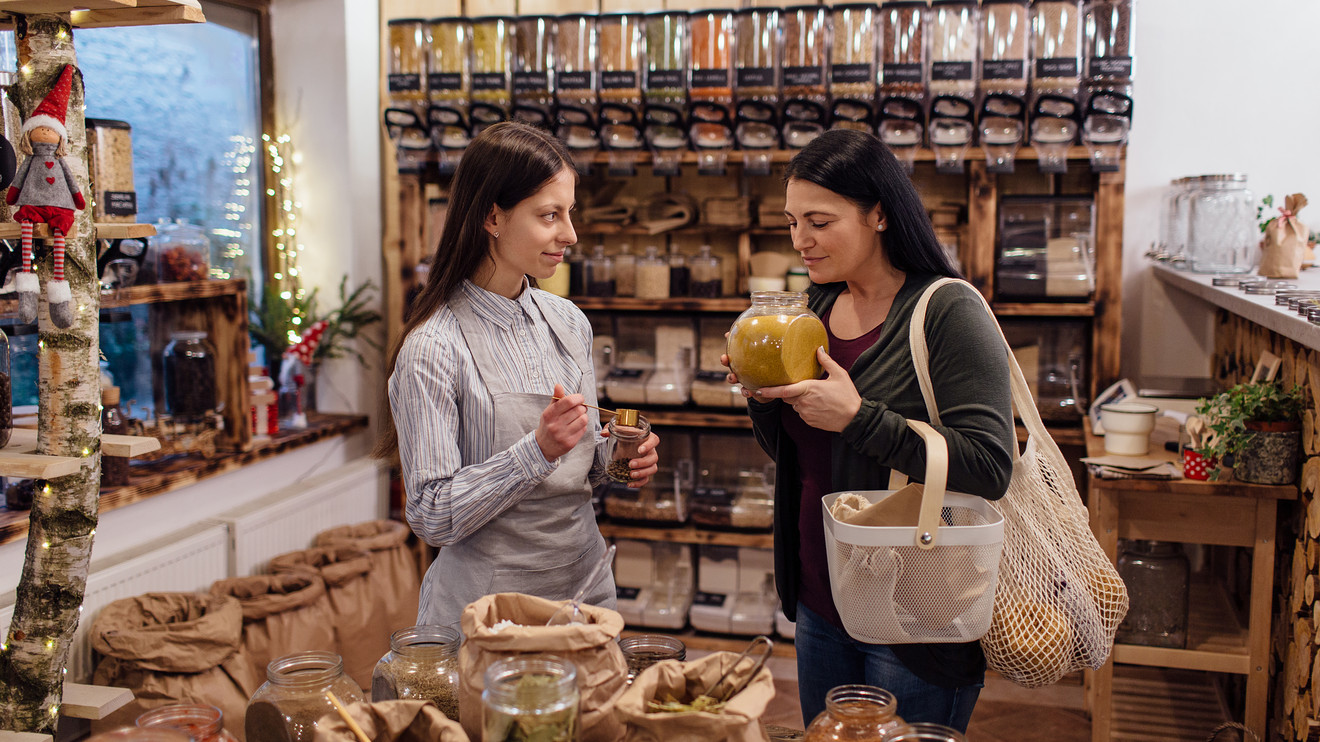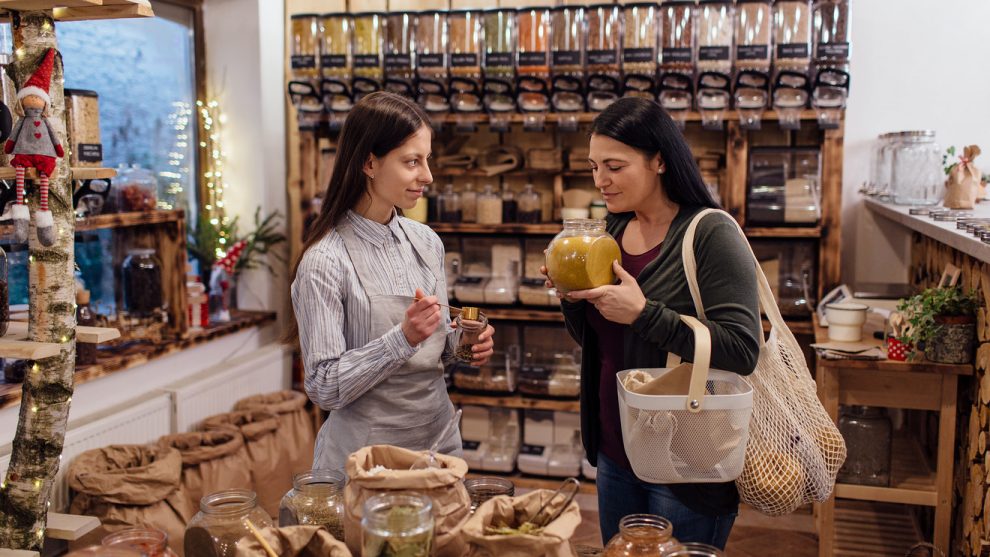
Use less, save more.
That’s the pitch some restaurants and food companies are giving consumers who get discounts when they bring in reusable salad bowls or glass Mason jars. The zero-waste movement has also motivated some businesses to upcycle their coffee grounds so they can be turned into hand soap, and swap plastic cocktail straws for ones made of pasta.
Just Salad, a fast casual chain that serves salads, wraps and grain bowls, is using an eco-friendly approach to lure customers in to buy salad every day for a month. Customers pay $129 for a month of salads, but they have to use the chain’s reusable salad bowl to get the deal, which works out to $4.16 per salad per day, compared to an average price of $12. Customers who visit the chain less frequently can also buy a reusable bowl for $1 and will get free toppings every time they use it. (Just Salad says it’s not responsible for lost or stolen bowls.) The U.S. Environmental Protection Agency honored Just Salad with WasteWise award in 2017 for the program.
‘You give people an incentive where every time they come they save X amount and it adds up. It benefits them, the environment and in some cases, the company.’
The chain said it saw a 38% increase in reusable bowl purchases in the past year. And 25% of all guests already use a reusable bowl when visiting the chain, which saves more than 75,000 pounds of plastic each year, Just Salad told MarketWatch.
Other restaurants, like Ancolie, an eco-conscious eatery in the West Village neighborhood of Manhattan, have a more jarring approach to sustainability. The restaurant serves the majority of its menu items –– coffee, fruit, salads, grain bowls and dessert –– in glass Mason jars. Menu prices include a $2 deposit for the jars, but if eaters come back with the glass containers they get discounts on their next meal. A salad, for example, is $11.75, but the price drops to $9.75 if a customer remembers to bring back their jar. Jars come in three sizes: 12-ounces for a small; 24-ounces for medium and 32-ounces for a large. Chloe Vichot, the owner and founder, said the jar return rate among customers is 40%.
“People are paying a little bit more, but if they keep it we’re not losing money and if they return it we’re we’re not buying new packaging,” Vichot said.
See also: This is how much Americans waste just by getting takeout food
The clear, environmentally-friendly vessels double as the ultimate marketing tool on Instagram FB, -0.05% the business displays its colorful parfaits, acai bowls and multi-layered salads for more than 10,000 followers.
“I was like, ‘Oh it’s a no-brainer — everyone is going to be waiting on line to take pictures because it’s so Instagrammable,” Vichot noted of the photogenic, 100% recyclable containers, which are microwave and dish-washer friendly. If reducing waste isn’t enough of a selling point for consumers, Vichot designed the recipes to be aesthetically pleasing so customers get a tasty meal, and a photo opp. “The visual aspect was very important to me. That’s clearly something that’s been helping my business for sure.”
Containers and packaging, some of which are food-related, contribute to more than 23% of trash that ends up in landfills in the U.S., the equivalent of about 39 million tons per year, according to the EPA.
Wasting less is better for business, too. More than half of consumers (66%) say they’re willing to pay more for products from brands that follow environmentally-friendly practices, a report by market research firm Nielsen found.
“There’s a big uptick in people who are willing to carry around reusable containers. It’s becoming the standard,” said John Oppermann, executive director at Earth Day Initiative, an organization that advances environmental awareness.
Even big food brands like Nestle’s NSRGY, +0.24% Lean Cuisine are jumping on the no-waste movement. The frozen dinners brand will launch three Asian-inspired meals in transparent, reusable cups each retailing for $2.99 each next month nationwide.
It’s also worth noting that the U.S. generates an estimated 571,000 tons of food waste in restaurants alone each year. And many restaurateurs and food companies are thinking up clever ways to reuse food or leftovers that would otherwise be thrown away.
At New York-based cafe and restaurant Maman, customers get 10% off when they remember to bring their own coffee cups. The team partnered with 2nd Ground, a Brooklyn soap company that uses ingredients like espresso and coffee grounds, and will donate its coffee grounds to 2nd Ground instead of tossing them in the trash. Maman sells the $10 soap, in espresso and lavender flavors, at its shops in New York City.
The zero-waste trend has also made its way into cocktails. At the newly opened Feroce restaurant inside the Moxy hotel in Manhattan’s Chelsea neighborhood, cocktails come with straws made out of hollow tubes of pasta instead of paper or plastic.
The move toward reduced waste positively impacts the environment while allowing restaurants and food brands to boost their own bottom line as consumers seek out mission-driven companies, Oppermann said. Plus, businesses could get another bonus: an increase in repeat customers when diners purchase a reusable container.
“You give people an incentive where every time they come they save “X” amount and it adds up. It benefits them, the environment and in some cases, the company,” Oppermann said.
Get a daily roundup of the top reads in personal finance delivered to your inbox. Subscribe to MarketWatch’s free Personal Finance Daily newsletter. Sign up here.






